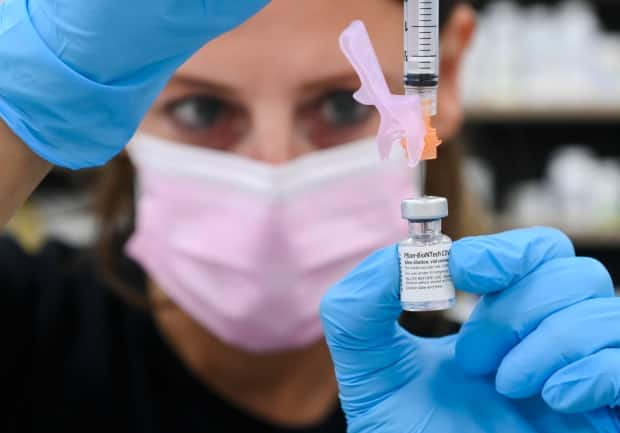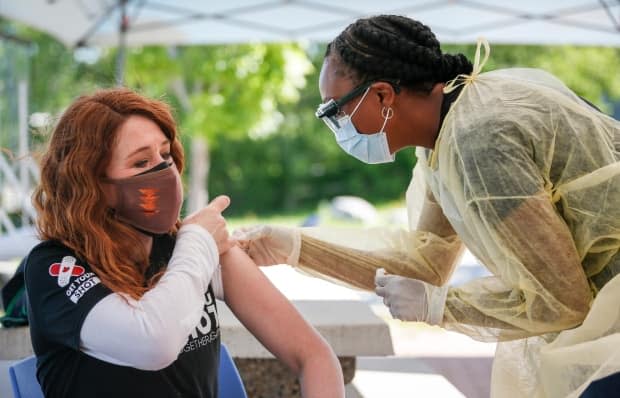Why mixing Pfizer and Moderna vaccines could help Canada end the pandemic sooner

Canadians who are offered a different COVID-19 vaccine for their second shot than their first shouldn't hesitate to mix and match, experts say, as supply temporarily shifts from Pfizer-BioNTech to Moderna.
Pfizer's weekly Canadian shipment of 2.4 million doses was temporarily delayed this week, causing provinces to change appointments to Moderna due to an increase in supply of that shot and to avoid losing steam in the vaccine rollout at a critical time.

The move comes after Canada's National Advisory Committee on Immunization (NACI) updated its guidance earlier this month allowing for the Moderna and Pfizer vaccines to be used interchangeably, due to the fact that they both use a similar mRNA technology.
But there have been increasing reports of Canadians turning down second doses of Moderna at vaccine clinics if they'd already received a shot of Pfizer, over misguided concerns that mixing the two shots may not be as safe or effective.
Dr. Kashif Pirzada, an emergency physician in Toronto, said he's seen people actually show up to booked appointments expecting to receive a second dose of Pfizer and then leave when they're told they'd actually be receiving Moderna.
WATCH | Is it OK to mix Pfizer and Moderna vaccines?
"There seems to be this preference for Pfizer that's been hard to explain," he said.
"It's unfortunate when people cancel their appointments, because if you look at the structure of the vaccines, they're identical in almost every way and if you look at the way they perform ... they almost always mirror each other."
Dr. Gerald Evans, the medical director of infection prevention and control at Kingston Health Sciences Centre and chair of infectious diseases at Queen's University, said he was surprised to hear the same thing.
"Staff at our vaccination clinic were saying people showed up, they were excited about getting their vaccine and they were told they were going to get Moderna and then they said, 'Oh, I think I'll wait until I get Pfizer,'" said Evans.
"Don't refuse Moderna, it's a really good vaccine — it's easily the equivalent of Pfizer."
Moderna 'under the radar' compared to Pfizer
Experts say the sheer volume of Pfizer shots given out in Canada to date compared to Moderna could lead to different perceptions of the mRNA vaccines from the public that could be fuelling vaccine shopping, or worse, vaccine hesitancy.
Pfizer has made up the lion's share of Canada's vaccine rollout, with more than 17.8 million Canadians receiving at least one dose of it so far — compared to just over 4.4 million with Moderna.
"I think that the familiarity makes people feel more comfortable," said Dr. Lynora Saxinger, an infectious diseases physician and an associate professor at the University of Alberta faculty of medicine in Edmonton. "Moderna has been plagued with delays and smaller shipments, so it's been more below the radar."
To date, more than 66 per cent of Canada's total population have received at least one dose of a COVID-19 vaccine; more than 20 per cent are fully vaccinated with two doses.
But experts say taking our foot off the gas now in rolling out vaccines could jeopardize the progress we've made in controlling the pandemic in recent weeks — with an 80 per cent decline in COVID-19 cases and a drastic drop in hospitalizations and deaths since mid-April.
Alyson Kelvin, an assistant professor at Dalhousie University and virologist at the Canadian Center for Vaccinology in Halifax, said Canada needs to keep pushing its rollout to avoid future problems.
WATCH | Toronto to mix mRNA vaccines amid Pfizer shipment delays:
"That's ultimately what's going to protect us from [the virus] for longer periods of time, it's going to keep people out of hospitals," she said.
"So it's highly important that we are getting two doses into everybody as soon as possible."
Dr. Jeff Kwong, an epidemiologist and senior scientist at the Toronto-based research organization ICES, said declining a second dose of Moderna in favour of Pfizer could affect others as well.
"We can only vaccinate so many people per day, so the people not getting vaccinated tomorrow mean that the people who would be getting vaccinated tomorrow are going to be vaccinated even later," he said.
"If you don't get it today, [that] doesn't mean you can necessarily get it next week when the Pfizer shipment does come in."
Mixing and matching vaccines 'not a new concept'
Kelvin said Canadians need to keep in mind that they are "incredibly lucky" to be offered both a first and second dose of either Pfizer or Moderna, especially because they are "so interchangeable."
Toronto-based pharmacologist Sabina Vohra-Miller said the two vaccines are "highly similar" in how they train the immune system to target the virus' spike protein. The antibodies that are formed in the body from either shot would "cross react really, really well," she added.
"There's really no reason to believe that the two vaccines would have any significant concerns with respect to efficacy or safety," she said. "It's not a new concept, we do it for so many other vaccines. People who go and get the influenza vaccine have no idea what they're getting."
Saxinger from the University of Alberta said it's possible many Canadians will need boosters of different types of vaccines in the future to fine tune the immune response against COVID-19 and reduce the threat of coronavirus variants of concern.
"It's quite likely that people will have a smorgasbord of vaccines over the next few years. So if you didn't get one now, you might be offered it in the future," she said.
"It's entirely possible that we will be preferring to mix it up a little bit and that's something we're going to figure out as we go along."
Delta variant underscores need for 2 doses
One added wildcard in the race to vaccinate as many Canadians as possible in the coming weeks is the threat of the delta variant first identified in India, also known as B.1.617.2, which now makes up more than 50 per cent of COVID-19 cases in Ontario.
A recent study from Public Health England (PHE) found the Pfizer vaccine was 88 per cent effective against symptomatic disease from the delta variant two weeks after the second dose, compared to 93 per cent against the B.1.1.7 variant, also known as alpha.
Two doses of the AstraZeneca-Oxford shot were found to be just 60 per cent effective against COVID-19 symptoms from delta, compared to 66 per cent against alpha.

And a single dose of Pfizer and AstraZeneca were each only about 33 per cent effective against delta.
"The risk is if you're waiting to get your second dose of Pfizer when you could very well get Moderna tomorrow and be fully protected," Vohra-Miller said. This behaviour is particularly troubling given there are other countries still battling devastating COVID-19 waves, she added.
"There's so much of the world that is just desperate for any vaccine, and here we are snubbing our nose to get like one of the best vaccines out there and to me it just makes no sense at all."

 Yahoo Movies
Yahoo Movies 